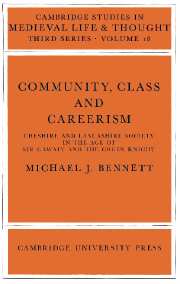Book contents
- Front Matter
- Contents
- List of maps and tables
- Acknowledgements
- Abbreviations
- Genealogical table
- Introduction
- 1 THE REGIONAL SOCIETY
- 2 THE COUNTY COMMUNITIES
- 3 LESSER SOLIDARITIES
- 4 THE POPULATION
- 5 LANDED SOCIETY
- 6 THE PEASANTRY
- 7 TOWNS, TRADE AND INDUSTRY
- 8 THE CHURCH
- 9 MILITARY SERVICE
- 10 POWER, PATRONAGE AND PROVINCIAL CULTURE
- 11 CONCLUSION
- Bibliography
- Index
5 - LANDED SOCIETY
Published online by Cambridge University Press: 22 September 2009
- Front Matter
- Contents
- List of maps and tables
- Acknowledgements
- Abbreviations
- Genealogical table
- Introduction
- 1 THE REGIONAL SOCIETY
- 2 THE COUNTY COMMUNITIES
- 3 LESSER SOLIDARITIES
- 4 THE POPULATION
- 5 LANDED SOCIETY
- 6 THE PEASANTRY
- 7 TOWNS, TRADE AND INDUSTRY
- 8 THE CHURCH
- 9 MILITARY SERVICE
- 10 POWER, PATRONAGE AND PROVINCIAL CULTURE
- 11 CONCLUSION
- Bibliography
- Index
Summary
While the value of obtaining some quantitative conception of Cheshire and Lancashire society in the later middle ages is obvious, it needs stressing that such a concern would have seemed alien to contemporaries. It is true enough that princes and lords were aware of the value of a prolific population, and could appreciate the grave consequences of the demographic crises of the fourteenth century. Yet, in so far as men had a conception of the social structure, their terms of reference were qualitative. In the traditional view, society was an ordered hierarchy in which the various ranks maintained degrees of power and influence totally unrelated to their numerical size. If numerical significance were attached to the population, it was more as a reflection of the status of the lords who commanded their allegiance. Indeed the concept of nobility and the institution of lordship permeated the entire social structure, welding together the disparate orders into a single system of deference and patronage. For the most part individuals and groups were evaluated according to their positions on this hierarchical scale. While statistical information is vital to an understanding of many aspects of the social process, it must be appreciated that the social system of medieval England was primarily an ideological construct.
In proceeding with this study of regional society it is therefore important to examine some fairly direct and tangible expression of its value-system.
- Type
- Chapter
- Information
- Community, Class and Careers , pp. 67 - 89Publisher: Cambridge University PressPrint publication year: 1983
- 1
- Cited by



